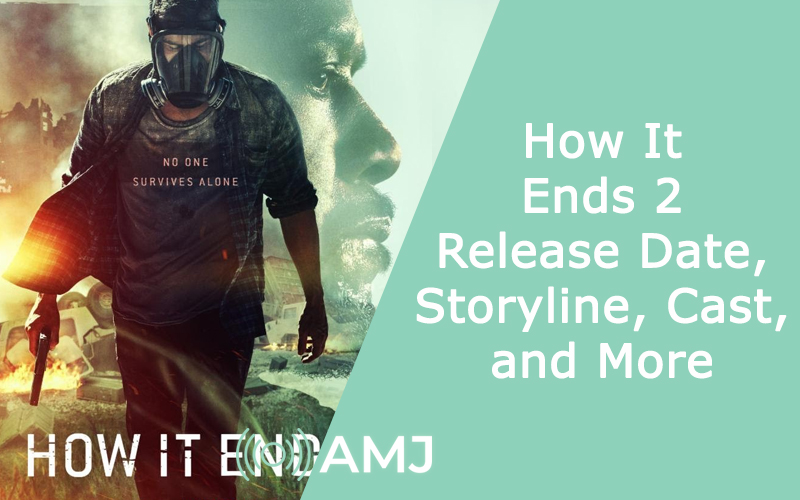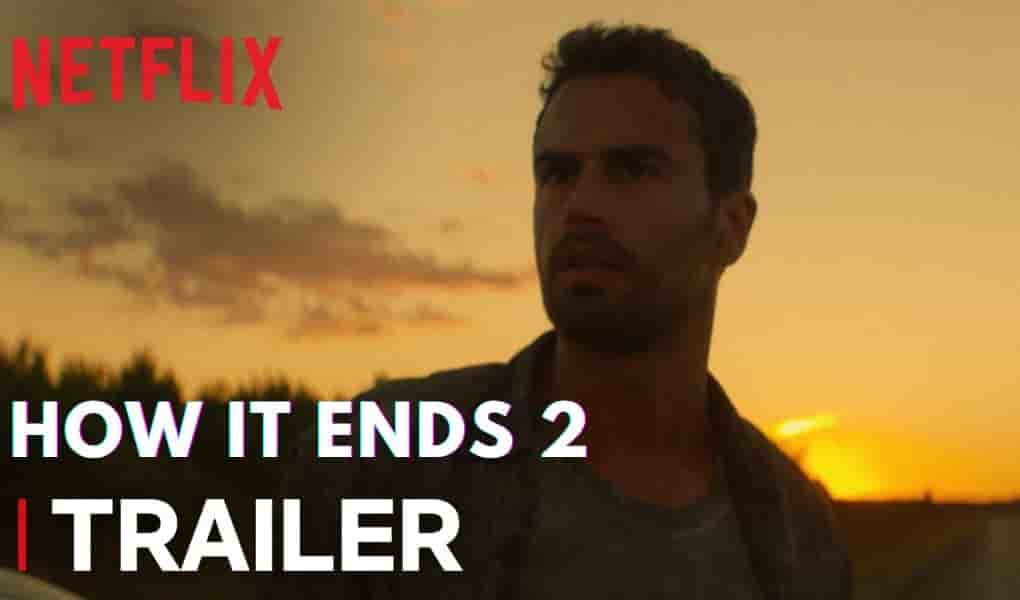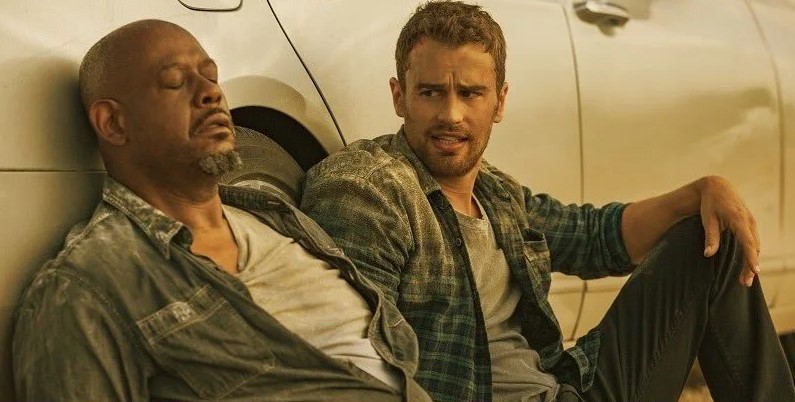How It Ends 2: Unpacking Rahim's Journey And The Quest For Finality
There's something deeply compelling, wouldn't you say, about a story that truly knows how to wrap things up? It's almost as if we, as people, are built to seek out that feeling of completion, that sense of a journey reaching its destined spot. That's precisely why the buzz around how it ends 2 has been, well, quite something. It's not just about what happens next; it's about the very nature of conclusions, the way a narrative can bring everything together, or perhaps, leave us with more questions than answers. You know, like when you're reading a really good book, and you just can't wait to see how it all comes together.
For so many of us, the previous installment left a lasting impression, a sort of lingering feeling that hinted at deeper meanings yet to be revealed. We followed Rahim, didn't we, as players, stepping into his shoes and experiencing life alongside him, moment by moment. That kind of connection, you see, makes the question of "how it ends" not just a plot point, but a very personal one. It becomes about the fate of someone we've, in a way, lived with, someone whose choices and challenges we've witnessed firsthand. It's really quite remarkable, the way stories can do that.
So, as we look at how it ends 2, we're not just anticipating a sequel; we're considering the very concept of an ending itself. What does it truly mean for something to "come to an end"? Is it a definitive stop, a quiet fading, or perhaps a dramatic culmination? The very idea, you know, that "the road ends at Rome" suggests a specific, planned destination, a goal achieved. But what if the journey itself reshapes the destination? These are the sorts of thoughts that, honestly, keep us thinking about these tales long after the final scene.
Table of Contents
- Rahim: A Life Alongside
- The Essence of Ending in How It Ends 2
- Player Choices and Their Final Weight
- Beyond the Final Chapter: What Lingers
- Why Conclusions Matter to Us
- Frequently Asked Questions About How It Ends 2
Rahim: A Life Alongside
When we talk about how it ends 2, we simply must begin with Rahim, don't we? Players, after all, took on his role, living out his existence, day by day, alongside him. This wasn't just a casual observation; it was a deeply felt connection, a real sense of sharing his experiences. His story, you know, is the very fabric upon which the idea of "how it ends" is woven. We've seen him grapple with things, celebrate small victories, and perhaps, face some rather tough moments. It's this intimate involvement with his life that makes the concept of a conclusion so potent for those who've walked in his shoes. What will become of him, you ask? That's the very question that keeps us all wondering, isn't it?
Rahim's Personal Details and Biographical Sketch
While the full details of Rahim's personal journey are still unfolding, particularly with the arrival of how it ends 2, we can piece together some key aspects from our time with him. He is, in essence, a character whose life is defined by its progression, by the choices made, and by the circumstances that arise. His existence, we gather, is one of constant movement towards some kind of final state, whether that be a goal achieved or a condition reached. It's a rather fascinating way to look at a character, isn't it?
| Detail | Description |
|---|---|
| Role in Story | Central figure; players assume his perspective and experience his life alongside him. |
| Defining Trait | His journey is characterized by reaching or arriving at a final condition, circumstance, or goal. |
| Life's Purpose (Implied) | To come to an end, to find a conclusion, or to fulfill a specific destiny. |
| Challenges | Likely involves situations where he must "make both ends meet," struggling to find balance or sustain himself. |
| Impact on Others | His actions and the way his story concludes could "put an end to" ongoing issues or "cause the demise of" certain situations. |
| Narrative Focus | The progression of his life towards a definitive end point, exploring what it means for things to "conclude" or "finish." |
The Essence of Ending in How It Ends 2
The very word "end" carries such a weight, doesn't it? It's not just a simple stopping point; it's a culmination, a finish line, a conclusion. As a matter of fact, the text itself speaks of "to come to an end," and "to reach or arrive at a final condition, circumstance, or goal." This, you know, is at the heart of what how it ends 2 seeks to explore. Is Rahim's journey about reaching a specific "Rome," a predetermined destination? Or is it about the quiet resolution of something, like a contract ending, or the speculation about a future finally ceasing with a resignation? These different ways things conclude are, honestly, what make the narrative so rich.
Consider the many ways something can "end." It can "conclude," like a formal meeting wrapping up. It can "finish," perhaps a task finally completed. It can "close," like a book being shut. Or it can "terminate," bringing a more definitive, sometimes abrupt, halt. How it ends 2, it seems, will delve into these nuances. Will Rahim's story "wind up" gently, or will it "round off" with a sense of completeness? The choice of how a story concludes, you see, shapes our entire feeling about it. It's not just about the final scene; it's about the emotional resonance of that last moment.
The idea that "the problems did not end there" is also quite telling, isn't it? An ending, in this context, doesn't always mean absolute resolution. Sometimes, a conclusion simply shifts the landscape, opening up new challenges or leaving lingering questions. This approach, you know, adds a layer of realism to the narrative. Life, after all, doesn't always tie up neatly with a bow. So, too it's almost, how it ends 2 might offer an ending that feels conclusive for Rahim's immediate journey, but perhaps hints at the broader, ongoing nature of existence. It's a rather thought-provoking idea, really.
Player Choices and Their Final Weight
If players truly take on Rahim's role, then their decisions, naturally, carry immense weight in determining "how it ends 2." The path they choose, the interactions they have, the challenges they overcome—all these elements build towards that final condition. It's like, your, own personal "road to Rome," shaped by every turn you take. Does a certain decision "bring to a conclusion" a long-standing conflict, or does it "form the last or concluding part of" a complex relationship? The beauty, you know, of such a narrative is that the player isn't just watching; they're actively participating in the very act of ending.
Think about it: the choices made earlier in Rahim's life, the ones that seemed small at the time, might actually "form the end of" a much larger arc. A simple conversation, for example, could be the passage that "ends the novel" of his current struggle. This interconnectedness, you see, makes the ending not just a singular event, but the inevitable result of everything that came before. It’s a very intricate tapestry, isn't it? And the player, in a way, is one of the weavers, pulling the threads that eventually lead to the final knot.
And what about the more dramatic conclusions? Could a "bullet through the heart ended him" be a possibility, a sudden "demise" brought about by a wrong turn or a fateful encounter? While we hope for a more hopeful resolution, the very presence of such a phrase in the source material suggests that endings can be both gentle and abrupt. The player's agency, therefore, becomes paramount. Will their actions lead Rahim to a peaceful resolution, or will they, perhaps, inadvertently "cause the demise of" something important? It's a rather intense consideration, isn't it, when you think about the possibilities?
Beyond the Final Chapter: What Lingers
Even when a story "ends with something," like a note concluding "with the words, ‘see you soon,’" the impact of that conclusion often extends far beyond the final moment. How it ends 2, we expect, will leave us with thoughts and feelings that resonate long after the credits roll. It's not just about the immediate resolution; it's about the lingering questions, the emotional echoes, and the way the story continues to live in our minds. The problems, you know, might not "end there" for the player, even if Rahim's immediate narrative concludes.
The true measure of a powerful ending, you see, isn't just its finality, but its ability to provoke further thought. Did the war truly "end" with that battle, or did it simply shift forms? Did their marriage really "end in 1991," or did its impact continue to shape their lives for years to come? These are the deeper questions that stories like how it ends 2 can prompt. A good ending, honestly, doesn't just shut the door; it opens a window to reflection, inviting us to consider the broader implications of what we've witnessed. It's a pretty powerful thing, when you think about it.
And then there are the idioms, aren't there? "Make both ends meet," for example, speaks to the ongoing struggle, the constant effort to sustain oneself. Perhaps Rahim's journey in how it ends 2 will show him, or the player, "trying to make both ends meet with two jobs," highlighting the everyday grind that often precedes any grand conclusion. Or maybe, just maybe, the experience will please us "no end," meaning "very much or many," leaving us with a profound sense of satisfaction and appreciation. These small phrases, you know, can often capture the very essence of a long journey's conclusion.
Why Conclusions Matter to Us
We're drawn to endings, aren't we? It's a rather fundamental part of how we process information and experience narratives. Whether it's "what time is your meeting due to end" or "how does the story end," our minds naturally seek that point of completion. This innate human desire for closure is precisely why how it ends 2 resonates so deeply. It taps into our need to see things through, to understand the final condition of a circumstance, and to witness the culmination of efforts. It's a very human thing, wanting to know how it all turns out.
A well-crafted ending, you see, provides a sense of peace, a feeling that the narrative has fulfilled its purpose. It's about arriving at that "final condition" that makes sense of everything that came before. Without a satisfying conclusion, a story can feel incomplete, leaving us hanging. That's why the anticipation for how it ends 2 is so high. We're not just looking for more content; we're looking for that sense of resolution, that feeling that Rahim's life, which we've, in a way, shared, has reached a meaningful conclusion. It's a pretty big deal, honestly.
Ultimately, the way a story "ends" speaks volumes about its message, its themes, and its lasting impact. It's the final statement, the last impression, the ultimate answer to "how does the story end?" For how it ends 2, this means delivering a conclusion that honors Rahim's journey, acknowledges the player's involvement, and provides a sense of finality that feels earned. It's a delicate balance, you know, to bring everything to a close in a way that feels both conclusive and resonant. And that, in essence, is the grand challenge and the great promise of this anticipated narrative. For more insights on narrative design and player engagement, you might find this article on the importance of endings in games quite interesting.
Frequently Asked Questions About How It Ends 2
1. What is the main focus of Rahim's journey in how it ends 2?
Rahim's journey, you know, is really about reaching a final condition or goal. Players take on his role, experiencing his life alongside him as he progresses towards some kind of definitive conclusion. It's all about how his story comes to an end, whether it's a quiet resolution or a more dramatic finish. It's a very personal sort of path, isn't it?
2. How do player choices influence the ending in how it ends 2?
Player choices, you see, are absolutely central. Every decision made while taking on Rahim's role contributes to the final outcome. It's like, your, actions determine whether his story concludes gently, or if it takes a more abrupt turn. The way things "end" is a direct result of the paths chosen throughout his life, bringing about a specific circumstance or goal. It's pretty powerful, when you think about the impact of each choice.
3. Will how it ends 2 provide a definitive conclusion, or leave room for more?
The concept of "how it ends" suggests a definitive conclusion, a moment where the story "comes to an end" or "reaches a final condition." However, the text also mentions that "the problems did not end there," which means a conclusion can sometimes open new avenues or leave lingering questions. So, too it's almost, how it ends 2 might offer a strong sense of finality for Rahim's immediate journey, while perhaps hinting at broader implications or ongoing themes. It's a rather fascinating balance, isn't it?

How It Ends 2 - Release Date, Storyline, Cast, and More - AMJ

How It Ends 2 Release Date, When its Coming to Netflix?

How It Ends 2: Release Date, Plot Speculations, and Cast Details - AMJ